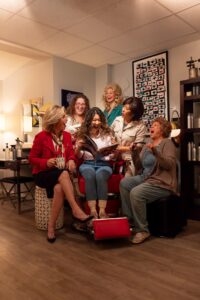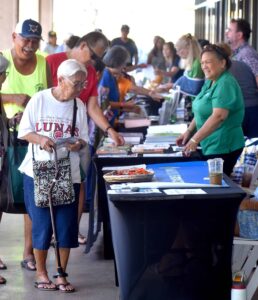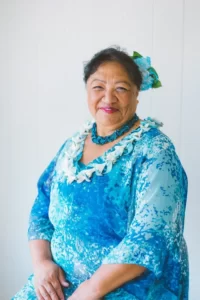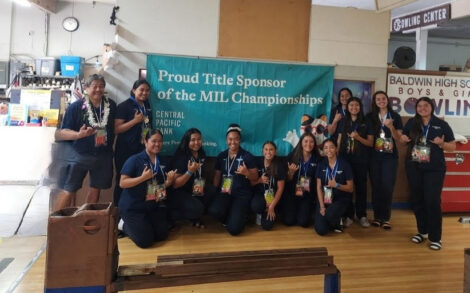Mayor: Liquor rules should be common sense
WAILUKU — Mayor Alan Arakawa suggested the Maui County Department of Liquor Control return to “common-sense rules” Wednesday after his office was inundated by complaints from the community over the past year.
However, the mayor also justified the department’s previous rule changes to allow 24-hour alcohol sales at retail stores and lifting the cap on hostess bars. Arakawa said that retail sales were “not that big of an issue” and lifting the hostess cap would have devalued owners’ licenses and power.
The mayor shared his thoughts on the department and Liquor Director Glenn Mukai during the Liquor Control Commission’s monthly meeting. He said he made a point to meet with commissioners to explain the annual, charter-mandated evaluation process of department directors.
The commission began its performance review of Mukai, who was appointed to his post in May 2016, in executive session Wednesday. Mukai has drawn heavy criticism from the public after pushing major rule changes and imposing stringent requirements over nonprofits earlier this year.
“My suggestion to all departments, including the liquor, is to go over your rules and start bringing them back to common-sense rules,” Arakawa said. “Look at what the purpose of those rules are. If the purpose is not being met and you’re over-regulating, change the rules so that any 10 people sitting in a room can say, ‘Oh that makes sense.’ ”
Commission Chairman Bob Tanaka said that the group would discuss its evaluation of Mukai at its next monthly meeting. He said the commission would then discuss its recommendations to the department.
Mukai declined comment Wednesday.
Red flags within the department began to raise shortly after Mukai took office, when about 45 businesses faced issues with their applications. Among them was the 64-year-old Maui Beach Hotel, which had lost its license for the first time ever over “minor technicalities,” the hotel’s attorney said.
Issues reached a boiling point earlier this year after the department proposed to allow 24-hour liquor sales, home delivery of alcohol and lift the cap on hostess bars. Retail stores, police and the general public were unaware of the changes signed into law in February by Arakawa until a story published by The Maui News the following month.
Hundreds of residents, community groups and law enforcement officials rejected the changes — which Mukai referred to as largely “housekeeping” — in testimony to commissioners and during protests on the street.
Arakawa said that he and the commission did not believe the 24-hour change was not going to be “onerous to the community.” He said he avoids micromanaging the department because he is not privy to all the details and information it reviews.
“To me it’s not that big an issue,” he said. “I don’t think it makes that much of a difference. The only people who are going to want to go are the people who are working late and don’t have time to go shopping.
“Whether they do or do not, the impact is not that great.”
Arakawa added that he agreed with the department lifting the cap on hostess bars. He said that limiting the number of licenses artificially inflates their value.
“Essentially it would close down most of the hostess bars because you have a limitation on it and it gives a value to it,” he said. “Once that valuation disappears, the ability to sell those license evaporates because if anybody can do it, there’s no value to holding the license.”
Arakawa had previously rejected removing the cap after it was maxed-out in 2012. Residents urged him not to lift the cap alleging that hostess bars drove families apart and promoted sex trafficking.
Tanaka and the commission sought to make the change for “free enterprise” reasons and that “supply and demand” would regulate numbers, according to a story published in The Maui News on April 30, 2012. Tanaka said at that time that the basic annual fee for a hostess license is $600, but that he had heard of licenses being transferred illegally for much more.
On Wednesday, a local attorney who declined to be identified recalled a client being paid a couple hundred thousand dollars about a decade ago to walk away from a license. The attorney said there was a push by people to get a license “when the economy was good,” but interest has died down.
There are currently about 10 hostess licenses, the attorney said.
Arakawa said that the island has not had any major problems with hostess bars “for generations.” He acknowledged that he is putting his trust in the liquor department and commission to come up with the proper evaluation.
“You’re seeing hostess bars closing down and not being able to even sell the license even though they’re limited,” Arakawa said. “So if you take away that extra value, it makes economic sense that they can’t utilize that pent-up value as a reason to keeping it open.
“There’s a lot of things that don’t sound right, but when you do it in the real world, it actually works.”
On the issue of single-event liquor license applications for nonprofits, though, the mayor did not support the department’s policies. He said he has spoken to Mukai many times and had him in his office to re-evaluate their operations.
Around May, the department began forcing all nonprofit board members and officers to submit to background checks, fingerprinting and to provide Social Security numbers. Department officials repeatedly cited a 2008 change in state law that required the checks, but the state Department of the Attorney General refuted the department’s understanding of the law.
“We’re pointing out that if it’s not a requirement and you’re creating a problem with nonprofit organizations — what’s the purpose?” Arakawa said. “The purpose is to bring an orderly methodology in which the community can prosper and be able to work with each other without causing problems. If the community is working well and there’s no real problem with it, you don’t need to over-regulate it.”
Maui County Council Member Yuki Lei Sugimura, who proposed rule changes regarding single events held by nonprofits that were adopted Wednesday, thinks that the issue in the department revolves around leadership. She said communication between the department, commission and community needs to improve.
“This is leadership and how to simplify their hard job in relationship in helping the community,” Sugimura said. “I truly believe it’s our responsibility to not be a hinderance and be a support if we can.
“That’s government. It should really get out of the way and try to help people.”
Kihei resident Madge Schaefer, who filed a lawsuit against the liquor department for its handling of the rule changes and nonprofits earlier this year, pleaded to commissioners that the department be more “user-friendly” to the public.
“Every dealing with this department has been difficult for the public,” she said.
Arakawa refused to give his personal assessment of Mukai because he felt it would be outside his scope and unfair. He said that if he based his decisions on public comment for everything, “we’d fire everybody.
“It’s the commission’s role to do the evaluation,” Arakawa said. “It really has to be a fair evaluation based on fact, not just innuendos.”
* Chris Sugidono can be reached at csugidono@mauinews.com.
- Glenn Mukai
- Mayor Alan Arakawa speaks to county Liquor Control Commission Chairman Bob Tanaka during the commission’s meeting Wednesday at the David K. Trask Jr. Building in Wailuku. The Maui News / CHRIS SUGIDONO photo








